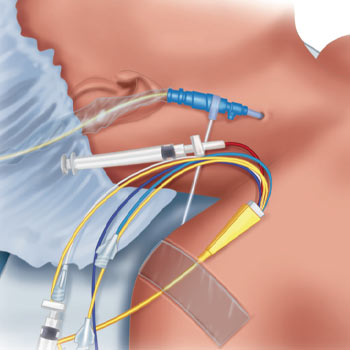PA Catheterisation
- Home
- Services
- Pulmonology
- PA Catheterisation
What is PA Catheterisation?
PA Catheterisation, or Pulmonary Artery Catheterisation, is a crucial procedure in pulmonary medicine that involves the insertion of a catheter into the pulmonary artery. This invasive technique provides valuable information about cardiovascular function and hemodynamics, aiding in the management of critically ill patients
What makes PA Catheterisation crucial for patient care?
PA Catheterisation is primarily used in intensive care settings and during surgical procedures to monitor various cardiovascular parameters. By directly measuring pressures within the heart and pulmonary arteries, healthcare providers can assess cardiac output, vascular resistance, and fluid status. This information is vital for diagnosing and managing conditions such as congestive heart failure, septic shock, and acute respiratory distress syndrome (ARDS)

What is the process involved in performing PA Catheterisation?
During PA Catheterisation, a thin, flexible catheter is typically inserted into a large vein, such as the internal jugular or subclavian vein, and guided through the right atrium and ventricle into the pulmonary artery. Once in place, the catheter can measure pressures at different points along its length, providing insights into pulmonary artery pressure, pulmonary capillary wedge pressure, and right atrial pressure
What are the key clinical uses of PA catheterisation?
Monitoring Hemodynamics
PA Catheterisation allows continuous monitoring of hemodynamic parameters, aiding in the titration of medications and fluid management
Diagnosis and Management
It helps in diagnosing conditions like pulmonary hypertension, cardiogenic shock, and evaluating responses to therapies
Surgical Guidance
During cardiac surgeries, PA Catheterisation provides real-time data on cardiac function, guiding intraoperative decision-making
What are the benefits of PA Catheterisation?
Provides precise hemodynamic data, facilitates targeted therapies, and improves patient outcomes in critical conditions
PA Catheterisation is a valuable tool in pulmonology and critical care medicine, offering detailed hemodynamic insights crucial for managing complex cardiovascular conditions. While its use requires expertise and carries risks, the benefits of accurate hemodynamic monitoring often outweigh the potential drawbacks. Healthcare providers must weigh these considerations when deciding on the appropriateness of PA Catheterisation for individual patients
